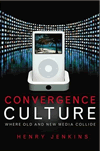What Are Aca/Fans?
Tuesday | October 24, 2006 open printable version
open printable version
Kristin here–
There was a time when studying film fans was something sociologists or film-industry marketing people did. Sociologists wanted to find out why fans behaved the way they did because it was interesting and often strange, and the industry wanted to figure out fan behavior so they could sell movies to them more effectively.
Then, a couple of decades ago, a new kind of expert came along: the fans themselves. People who had gone to the university to study film, television, literature, or other aspects of popular culture gradually realized that they could study themselves, their kids, and the people they met at fan conventions and later on the internet.
Prof. Henry Jenkins did not originate the study of fandoms, but he has been perhaps the most influential “aca/fan,” as he terms himself on his blog. (The term “fan academic” also gets used to describe this new field of study.) These days books and articles and web publications about fandoms are proliferating, but just about any of them will cite Henry’s seminal 1992 book, Textual Poachers: Television Fans & Participatory Culture (Routledge).
Henry doesn’t study fans to find out what makes them tick. He knows that. He’s one of them, a participant in fan cons, a player of video games, an explorer of the multimedia sagas like those of Star Trek and The Matrix that have grown up in the age of franchise culture. He received his doctorate here at the University of Wisconsin-Madison, where David was his dissertation advisor, and we have followed his career, as they say, with great interest. Straight out of the gate he was hired by MIT, where he is now the Director of the MIT Comparative Media Studies Program and the Peter de Florez Professor of Humanities. (Read more about his prolific and wide-ranging activities at his blog.)

This year two books by Henry appeared: Fans, Bloggers, and Gamers: Exploring Participatory Culture and Convergence Culture: Where Old and New Media Collide (both New York University Press). Given that my The Frodo Franchise has chapters on Lord of the Rings video games and fan culture on the Internet, I thought I’d start with the first. Henry assured me, however, that Convergence Culture represented a more current and probably more relevant overview, so I started with it instead.
This terrific book uses a series of case studies to give an overview of how digital media have expanded the possibilities for participatory fan culture. It also shows how the producers of popular culture have reacted to this new empowerment of the consumers. Only two chapters focus on films: “Searching for the Origami Unicorn: The Matrix and Transmedia Storytelling” and “Quentin Tarantino’s Star Wars? Grassroots Creativity Meets the Media Industry.” In the modern entertainment industry, however, films are increasingly linked to other media, and no one has a better grasp of the overall relationship among popular media than Henry.
Convergence Culture is unusual, perhaps unique, in offering an overview of the entertainment industry from the perspective both of the big corporations that control popular media creations and of the fans, who often appropriate those creations for their own purposes. Much of the book depends on interviews with fans and executives alike. Henry is evenhanded in dealing with both points of view—except when the big firms try to stifle fan creativity through intimidation and the invocation of copyright and trademark control.
Here Henry is firmly on the side of the fans. The chapter on Star Wars mentioned above reviews the love-hate relationship George Lucas has had with fan websites that post innumerable works derived from his saga. Another chapter, “Why Heather Can Write,” details how Warner Bros. attempted to squelch fan creativity based on the Harry Potter series. Henry provides a cogent argument for rewriting fair-use laws to accommodate amateur, not-for-profit activities that utilize characters and situations from copyrighted works.
So am I an aca/fan, too? I wouldn’t exactly describe myself as one, though in this new book I have dabbled in that approach, meeting many fellow Lord of the Rings fans in person and in cyberspace. One has to admire members of the various fandoms and the amount of time and effort they are willing to put into keeping themselves and others informed about the objects of their fascination. They also lovingly create their own works (fanfiction, fanart, machinema, RPGs, and so on) derived from their favorite books, games, movies, TV shows, and comics. Most of the results aren’t masterpieces, of course, but that’s true of “real” artworks created by professionals and aspiring professionals as well. If enough of just about anything gets made, some of it is bound to be good. I’ve found some excellent Lord of the Rings fanfiction among the many conventional, sometimes nearly unreadable tales I have sampled. And Chocolate Cake City’s Brokeback to the Future demonstrates what David likes to describe as “the spontaneous genius of the American people” (usually in reference to the speed with which any significant event generates a body of tasteless jokes, or, in this case, parodies).
For all the attempts to analyze audiences through questionnaires and interviews and other traditional methods, Henry shows that the best way to understand fans is as an insider. The aca/fan approach is spreading as the study of popular media and fandoms gains legitimacy within academe, and it is lucky to have an enthusiastic, intelligent pioneer in Henry Jenkins.













